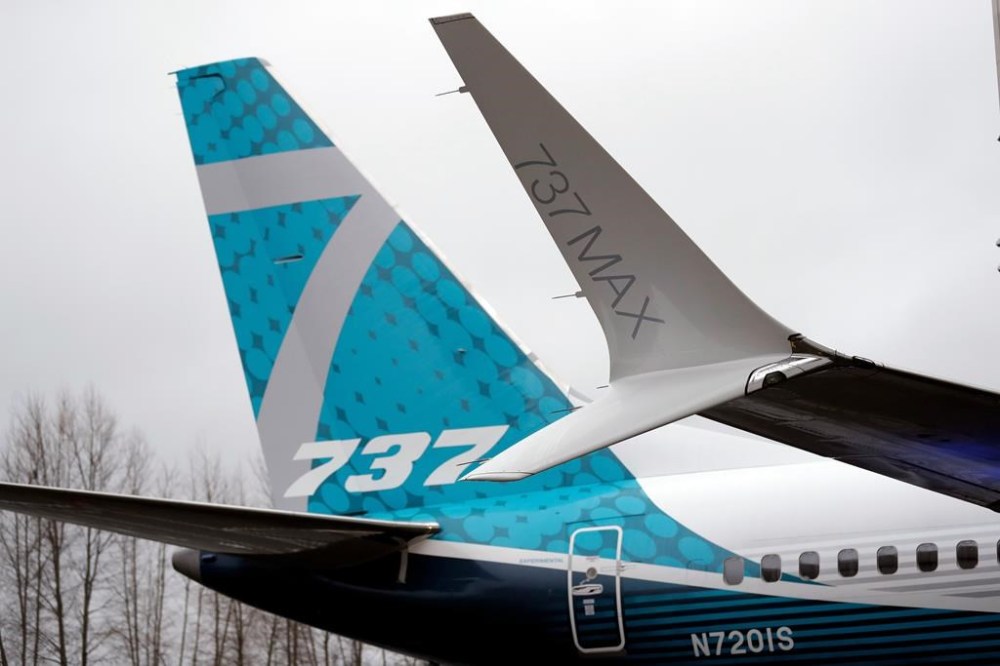Boeing asks airlines to inspect 737 Max jets for potential loose bolt
Advertisement
Read this article for free:
or
Already have an account? Log in here »
To continue reading, please subscribe:
Monthly Digital Subscription
$0 for the first 4 weeks*
- Enjoy unlimited reading on winnipegfreepress.com
- Read the E-Edition, our digital replica newspaper
- Access News Break, our award-winning app
- Play interactive puzzles
*No charge for 4 weeks then price increases to the regular rate of $19.00 plus GST every four weeks. Offer available to new and qualified returning subscribers only. Cancel any time.
Monthly Digital Subscription
$4.75/week*
- Enjoy unlimited reading on winnipegfreepress.com
- Read the E-Edition, our digital replica newspaper
- Access News Break, our award-winning app
- Play interactive puzzles
*Billed as $19 plus GST every four weeks. Cancel any time.
To continue reading, please subscribe:
Add Free Press access to your Brandon Sun subscription for only an additional
$1 for the first 4 weeks*
*Your next subscription payment will increase by $1.00 and you will be charged $16.99 plus GST for four weeks. After four weeks, your payment will increase to $23.99 plus GST every four weeks.
Read unlimited articles for free today:
or
Already have an account? Log in here »
Hey there, time traveller!
This article was published 29/12/2023 (695 days ago), so information in it may no longer be current.
Boeing is asking airlines to inspect its 737 Max jets for a potential loose bolt in the rudder control system, the airplane maker and Federal Aviation Administration confirmed this week.
The FAA said it would be “closely monitoring” the targeted inspections. The agency said Thursday that Boeing issued its inspection guidance to airlines after an international operator found a bolt with a missing nut during routine maintenance. In a separate case, Boeing also discovered an undelivered aircraft that had a nut that was not properly tightened.
“The issue identified on the particular airplane has been remedied,” the Arlington, Virginia, company told The Associated Press on Friday. “Out of an abundance of caution, we are recommending operators inspect their 737 MAX airplanes and inform us of any findings.”

Boeing added that it will continue to update both customers and federal regulators on the progress.
The FAA said it will remain in contact with Boeing and impacted airlines as the inspections are performed, and potentially “consider additional action based on any further discovery of loose or missing hardware.”
According to Boeing, there have been no in-flight incidents caused by this condition to date — noting that crews’ routine checks would signal if the rudder was not working properly before an aircraft pushes back from the gate.
The company added that all airplanes Boeing is set to deliver onward will have the inspection (which is estimated to take about two hours per plane) prior to delivery.
U.S. carriers with 737 Max jets in their fleet include United Airlines, Southwest Airlines, American Airlines and Alaska Airlines. All four of these carriers told The Associated Press Friday that they don’t expect operational impacts. Southwest, for example, said it was currently performing all of these inspections during routine overnight maintenance.

A firm timeline for the inspections wasn’t provided for each airline, but Alaska said it expected to complete the process by the first half of January.
Boeing’s 737 Max jets were grounded worldwide for 20 months after two crashes in 2018 and 2019 killed a total of 346 people. Investigations focused on an automated flight-control system that pushed the nose of the plane down based on faulty sensor readings. Boeing did not tell pilots and airlines about the system until after the first crash.
The FAA, which also faced criticism for the way it approved the Max jets prior to these deadly crashes, has since moved to provide a more-detailed certification process for large planes and required safety disclosures.





